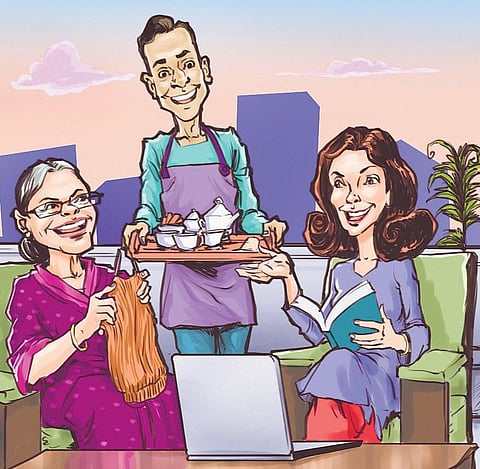

The memes are right, as is my mother. Once the COVID-19 is done and dusted (for now, we have every reason to hope humanity will defeat this virus), all of us would have sandpaper-hands after the marathon handwashing. My friends have asked for remedies. Everything from regular creams (low on stock), to aloe vera (for those fortunate enough to have planted those in their gardens), to ghee, butter, and coconut oil has been suggested.
In India, work-from-home has meant changes in many middle incomes and upper-class households—the help we depend on is no longer available in these times of safety distancing. This might fundamentally change equations in the Indian homes, just as the World Wars transformed households in the West. A large section of Indian men now understands what women do all day when the men work at the office.
Women who work at office must now to deal with working from home as well as recruiting the spouse and the kids to the kitchen and the chores. One-pot recipes are popular: not only do they make cooking and cleaning easier, they enable the use of leftovers. Women are discussing the sort of clothes to be worn under lockdown to minimise laundry.
Families are spending more time together at home than ever imagined. Nerves are frayed. I’ve had more than one conversation about the toll on mental health—women tend to be nourishers, and this is a time when everyone in the family needs mental (and physical) sustenance. Men have stepped up to help, but it is a woman, Mahita Nagaraj, who has taken the initiative to set up Caremongering, where volunteers, men and women alike, are reaching out to the stranded elderly, bringing them food and medication.
The lockdown is to last 21 days, but we’ve seen lockdowns extended in other countries. My girlfriends send out WhatsApp forwards that talk of cooking simple food. Not only is it better for health, they say, but the supplies last longer. Low supplies, having sandpapery hands or going nuts trying to handle work-from-home and cooking and cleaning without help is a matter of good fortune, though.
The homeless in the city, their women; where do they wash hands? In the slums, how does anyone practice safety distancing in rooms where men, women and children are packed in, cheek-by-jowl? The government and the non-profit sector are trying to step in, but only the coming days will prove if they’re equal to the challenge.
Ever since the announcement of the lockdown, scores of daily wage-earners have walked hundreds of kilometres, carrying their children and their meagre belongings, herding their elderly, to reach the villages they came from. Women are making the journeys alongside their men, without food, rest, or toilets, possibly carrying the virus to rural areas where healthcare is even weaker, and women far more susceptible to violence and discrimination.
Women on the frontline—cleaners and staff at hospitals, grocery outlets and pharmacies—are working right alongside men. Also countless healthcare professionals, without PPEs to protect them, in many cases, while facing discrimination. On my timeline, Indian nurses working in healthcare speak about wearing protective gear for 14 hours at a stretch without visiting toilets or eating or drinking.
Nurses from the northeast have been jeered because of their ‘Chinese’ looks, nurses and doctors evicted from homes because they are perceived as sources of infection. Women on the frontline of essential services have been told they can’t go to work, given the situation on the streets. In patriarchal India, women’s equality is a challenge in some urban, and most rural areas. And this virus might force some women to situations that are not ideal for them.
There might also be a change for the good.
We might all develop a new appreciation for the housewives who slog in the kitchen while straddling childcare and other housework, for the women who work as household help, for the teachers who enrich and engage so many children daily, for the ladies who work as cleaners, for the ones who work at grocery store check-outs, for the nurses and doctors and other healthcare professionals who are often overworked and underpaid.
Amongst all the frustration and surliness, there’s a new appreciation for women’s roles at home and office, especially the underprivileged ones. Everyone has been speaking with far-flung relatives and friends, but they’re also checking on the women who used to help at their homes, asking if they have enough. There might be moments of joy scattered amid all this mayhem after all, as we all learn to see each other again. Twitter: @damyantig